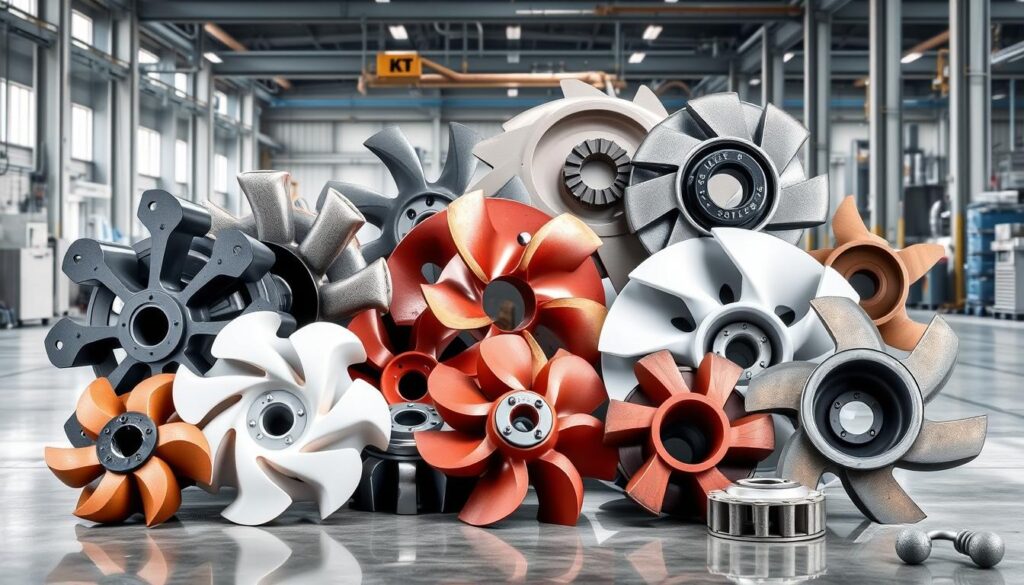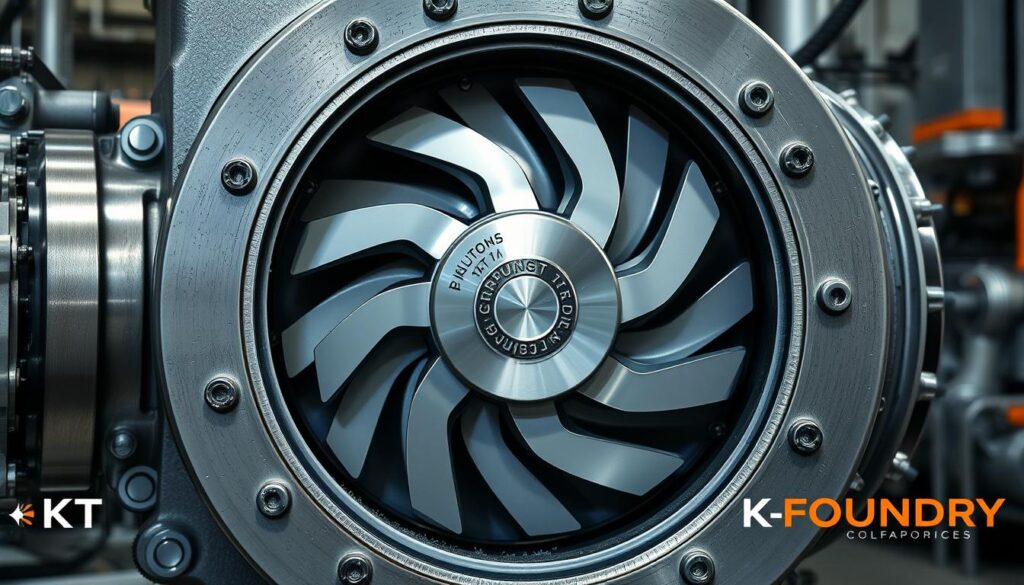At KT-Foundry, we’re proud to be a top maker and supplier of high-quality centrifugal pumps. Our pumps are made for many industrial uses, from farming to mining. They can handle tough environments. The impeller is key, helping to keep flow and pressure right by using the motor’s energy.
Impellers make centrifugal force and keep the pump efficient. Picking the right impeller is key for managing fluid well. It affects the pump’s performance, efficiency, and how long it lasts.
Key Takeaways
- Centrifugal pumps with high-quality impellers are essential for efficient fluid management in various industrial applications.
- Impellers play a vital role in transferring energy from the motor to the fluid, creating centrifugal force for optimal flow and pressure.
- Proper impeller selection is crucial to ensure pump performance, efficiency, and durability.
- KT-Foundry is a leading manufacturer of centrifugal pumps with exceptional impeller sets, catering to diverse industrial needs.
- Exploring cast iron impeller manufacturing can provide valuable insights into the importance of impeller design and materials in industrial pump performance.
Understanding Pump Impellers and Their Role
Pump impellers are key to centrifugal pumps, turning mechanical energy into kinetic energy. This energy moves fluids. The impeller, a rotating part, is vital for the pump’s performance and efficiency. Knowing about pump impellers helps us manage fluids better in many industries.
What is an Impeller?
An impeller is a spinning disk with curved blades. It pulls fluid into the center and pushes it out. This action increases the fluid’s pressure and flow rate. The impeller’s speed is crucial for the pump’s performance.
Types of Impellers
Impellers come in different types based on their design. These include:
- Open Impellers: These have vanes on a central hub without a cover. They’re good for fluids without solids.
- Closed Impellers: With vanes and a cover, they’re more efficient and handle fluids with solids.
- Semi-Open Impellers: They have vanes on one side of the hub. They’re great for fluids with solids.
- Recessed Impellers: They have a shroud with a cavity. They handle fluids with lots of solids.
- Vortex Impellers: They have a recessed chamber for a vortex. They’re best for fluids with gas.
It’s important to know the special features and uses of each impeller type. This helps choose the right pump impeller for a specific need.

Selecting the Right Industrial Pump Impeller
Choosing the right impeller for your industrial needs is key. It affects how well the fluid moves and how the pump works. Things like the fluid’s type, how fast you need it to flow, and how much energy it uses are important. [https://kt-foundry.com/optimizing-fluid-dynamics-the-role-and-innovation-of-centrifugal-pump-impellers/]
Impact of Impeller Diameter
The size of the impeller matters a lot. A bigger impeller can move more fluid, which means faster flow. But, it uses more energy to spin, which raises costs.
A smaller impeller uses less energy but can only handle slower flows. Finding the right size is about balancing these needs. It’s about picking the right impeller diameter for the best pump performance and pump efficiency, while keeping energy use low.
“Choosing the right impeller type and diameter is crucial for optimizing fluid dynamics and pump performance in industrial applications.”
At KT Foundry, we make custom impellers for your industrial needs. We focus on impeller selection, impeller diameter, and system efficiency. Our goal is to improve pump performance and save on energy consumption.
Conclusion
The industrial pump impeller is key to managing fluids efficiently. We’ve looked at what pump impellers are, their types, and why picking the right one matters. By focusing on impeller size, we can make our pumps work better and handle fluids more effectively.
Looking ahead, keeping up with new pump impeller tech is vital. Using these advancements can help us stay ahead in the game. This way, we can boost productivity, cut down on energy use, and help make our industries more eco-friendly.
The pump impeller is more than just a part; it’s essential for our industrial success. By getting better at choosing and caring for impellers, we can achieve greater efficiency and cost savings. This puts our companies on the path to lasting success.
FAQ
What is the role of an impeller in a centrifugal pump?
The impeller is key in a centrifugal pump. It keeps the flow and pressure right by using the motor’s energy. It makes centrifugal force and keeps the pump efficient.
What are the different types of impellers?
There are many types of impellers, like open, closed, semi-open, recessed, and vortex. Each fits a specific use and fluid type.
How does the impeller diameter affect pump performance?
A bigger impeller can move more fluid, leading to higher flow rates. But, it needs more energy, which means higher costs. A smaller impeller uses less energy but moves less fluid, leading to lower flow rates. The right size depends on flow rate, head, and fluid type.
What factors should be considered when selecting an industrial pump impeller?
Choosing an impeller involves looking at the application and fluid. Also, consider the flow rate, efficiency, maintenance, and cost. Think about flow rate, head, specific gravity, viscosity, and solids content for the best performance.


